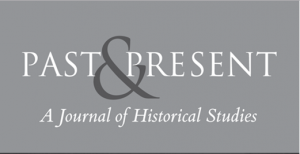by the Past & Present editorial team
Past & Present was delighted to hear that Jake Richards (Gonville and Caius, Cambridge) has been awarded this year’s Alexander Prize, by the Royal Historical Society (RHS); for his article “Anti-Slave-Trade Law, ‘Liberated Africans’ and the State in the South Atlantic World, c. 1839-1852” which appeared in Issue 241.
The Alexander Prize is awarded annually by the RHS for the best published scholarly journal article or an essay in a collective volume based upon original historical research. In “Anti-Slave-Trade Law, ‘Liberated Africans’ and the State in the South Atlantic World, c. 1839-1852” Richards explores how:
From 1807 onwards, bilateral slave-trade treaties stipulated how naval squadrons would rescue slaves from slave ships, and how states should arrange the settlement and apprenticeship of these slaves, to transform them into ‘liberated Africans’. Comparing interactions between the state and liberated Africans at sea along the South African and Brazilian coasts, and in the port towns of Cape Town and Salvador, reveals how the legal status of liberated Africans changed over time. Current scholarship has framed liberated Africans in terms of whether they were attributed rights or suffered re-enslavement, and thus focused on their solidarity through claiming rights, ‘ethnic survivals’ or creolization. Instead, this paper argues anti-slave-trade legislation ascribed to liberated Africans a set of unguaranteed entitlements – promises regarding status and treatment without obligating states to uphold that status or treatment. By focusing on the precise aspects of legislation that operated at each point in the process of anti-slave-trade activity – rescuing slaves from slave ships, transportation to a port, processing through a court, and apprenticeship – this paper unearths how the law came into force in the encounter between state officials and liberated Africans, as part of the complex transition from slavery to free labour.
The article is available through open access free for all to read.
In their citation explaining their decision to award Richards the prize the judges stated that:
This rich and thoughtful article follows the experiences of ‘liberated Africans’ after the formal abolition of the slave trade, as the seizure of ‘prize negroes’ from slave ships opened a complicated chapter in the establishment of their rights and status. Based on detailed and wide-ranging research, tracking histories between Britain, South Africa and Brazil, the article reaches beyond existing debates to consider the experience of those who were liberated by the anti-slave patrols in the Atlantic ocean: the ways in which they understood and negotiated a way through the legal processes that faced them, and their claims to what Richards refers to as ‘unguaranteed entitlements’ in their transition from enslavement. Achieving a satisfying balance between specific cases and more general reflections, the article makes an important contribution to research, offering fresh ways of thinking about the topic and exploring the fascinating context of the port cities of Salvador da Bahia and Cape Town as testing grounds for the impact of abolition and the future prospects of the ‘liberated Africans’.
Our congratulations to Jake Richards for the achievement. We are delighted that his scholarship has been recognised in this way.

